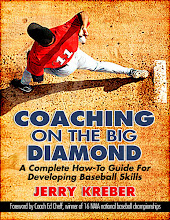Monday, January 29, 2007
The Opposite End of the Spectrum

Describing the Process of Player Development
In the last few years, Michael Lewis's book Moneyball has received a lot of attention because of the Oakland Athletics successful run through the competition with a medium sized payroll. Oakland's scouting techniques have been hailed as an effective way of evaluating talent throughout the amateur ranks. Many business professionals have looked at Moneyball as a guide to set up productive company employee models.
One book, published in 2005, has been overlooked in the wake of Moneyball. Authored by Bill Shanks, Scout's Honor, is a rebuttal to the opinions and techniques expressed in Moneyball. Mr. Shanks takes readers through the Atlanta Braves Player Scouting and Development System. He describes how the Braves draft players and provides insights to what the organization concentrates on when looking to select an amateur player. The book actually takes the reader through a few case studies that follow players all the way through to the Major Leagues.
As a coach, both books are an awesome resource for building a program. I look at both of these books as an approach to strategizing the game. Moneyball is an offensive approach, while Scout's Honor is a pitching/defense approach. When put together, it can be a dangerous combination. High school coaches have an opportunity to play both sides of this debate. By incorporating a offensive philosophy that produces walks and high on-base percentages fulfills that Moneyball criteria. This approach led to an abundance of opportunity to scoring runs.
On the defensive side, if you practice the development of pitchers, like the Braves model, games could be won or lost on the mound. Atlanta’s developmental philosophies hinged on getting young players innings, no matter what projection they labeled the player as starter, reliever, or closer. Furthermore, Atlanta’s pitchers trained under Leo Mazone’s belief in throwing during the off-season for an extended period. He believes that the more a player throws the baseball the better pitcher they will become.
In conclusion, both books give coaches an avenue to improve their team on a yearly basis. I think by reading Scout's Honor I have expanded my knowledge on player development in the amateur setting by giving players the innings needed to improve. Also, looking a players from a "make up" aspect instead of a "production" aspect. One outcome of reading this book might be that a player's make up leads to their production. Whatever the differences between each selection, both are worth the time to consume the information.
